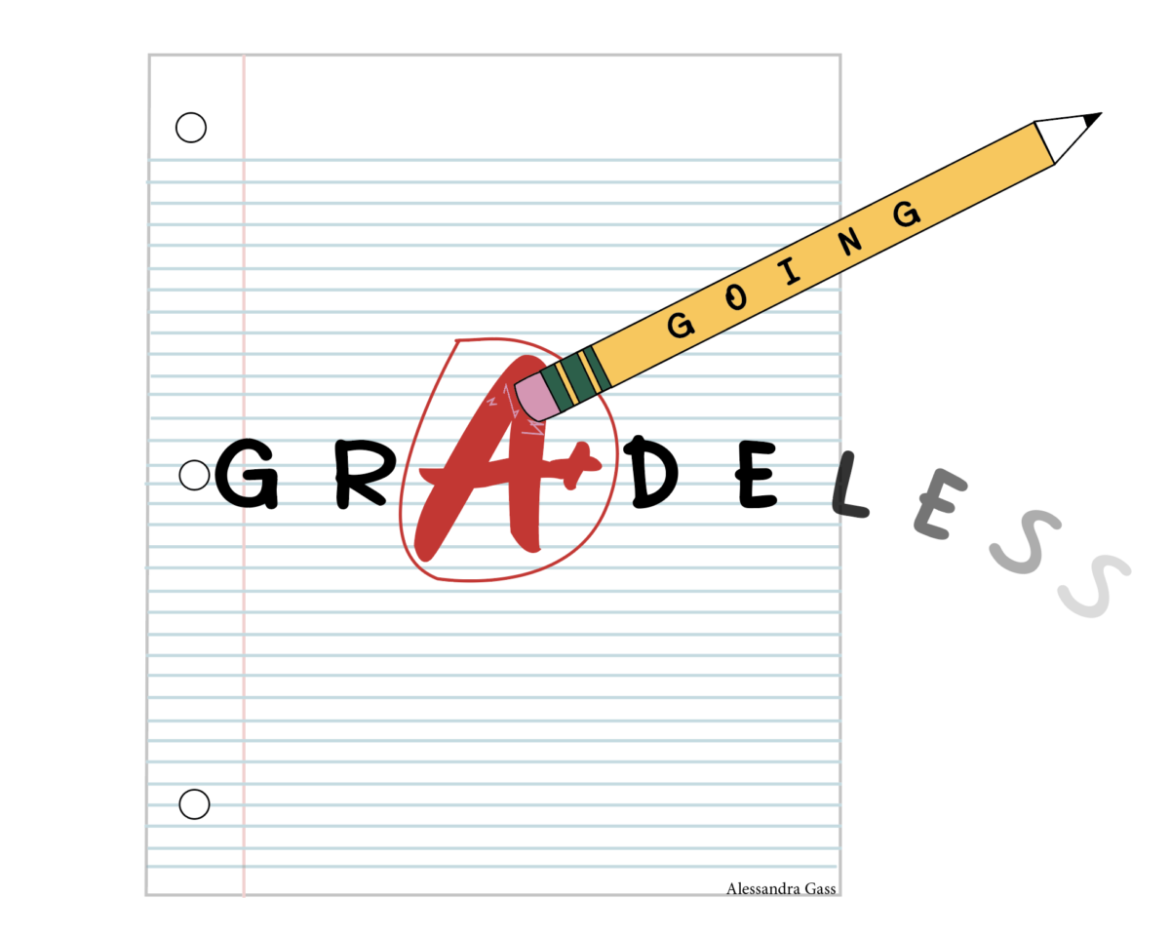Alessandra Gass, Features Editor
@agasscourant
The numerical percentage attached to each course is meant to encapsulate the intellectual ability of high schoolers everywhere. The slight fluctuation in grades can change everything for a young student, whether it be college acceptance, scholarship opportunities, or the determination of self-worth. For these reasons, the mere thought of a gradeless classroom once seemed inconceivable. However, the growing number of teachers who have shifted away from the traditional grading system argue that it offers a more equitable and student-centered way of assessing learning. By focusing on feedback and growth instead of grades, students are encouraged to take risks, make mistakes, and learn from them. Yet, the question remains: does the adoption of a gradeless approach justify the shift away from traditional grading practices?
Mr. LeDuc, Chair of the Science Department, has found ways to implement forms of self-reflection to better prepare students for future work and despite rigid college-board requirements for advanced placement courses. “There has been a shift in the school emphasizing self-reflection. We see this in the Mastery Based Diploma, a portfolio of reflection required for graduation, that seniors complete,” he said. “We should be teaching these skills over the course of four years, rather than a single reflection exercise at the end.”
Sophomore Fifi Staron has recently experienced a shift in assessment in her English classroom, as her current teacher chooses to focus on process and reflection, rather than her previous teacher that assigned traditional rubric-based grades to polished pieces. “Last year was very traditional in the sense that we would be assigned a piece, work on it for a few weeks, and then receive a single grade based on a rubric,” she said. “We weren’t really given feedback, just a grade based on how well the teacher decided your piece was written. Now, we’re allowed to reflect on the process of each piece and give ourselves grades based on how well we feel we performed personally”
Isabella Madrid has also experienced the shift from traditional grading to self-grading, and is grateful for the time she’s spent reflecting on her own abilities. “There’s definitely an adjustment period since we’re so conditioned to receiving individual grades on each assignment, however, this year has allowed me to reflect upon my writing in a way that I haven’t before,” she said. “I used to just press submit and not give the piece a second thought, but I’m now able to consciously measure my growth and areas of improvement.”
Being able to focus on the process rather than the product has proved beneficial for students in a multitude of areas, one of which being anxiety and stress. “The biggest positive to come out of my experience in a gradeless English classroom is a lessened amount of stress and anxiety,” said Emilia Martinez. “You’re not constantly worried about the next grade, which allows you to take risks and really grow your skills and style as a writer.”
“Even if you don’t do too well on an assignment, it doesn’t kill your grade and discredit your other accomplishments, as you’re allowed to explain circumstances and fight for your final quarter grade.” said Emilia.
Due to alternate forms of assessment and less rigidity within classrooms, students are now provided with nuanced ways to approach class. “I’ve seen many teachers provide their students with options in how they use their class time,” Mr. Leduc said. “Whether it be practice problems or group work, there’s now a focus on independently refining individual skills rather than the traditional group lecture.”
However, the switch has not been without its challenges. “A major complaint I have regarding the gradeless classroom is the inconsistency across the board with the overall grades,” said Isabella. “I’ll receive the same quarter grade as another friend in the class who may not have done as well on the activities that we do in class. Since the grade isn’t a buildup of cumulative points, it’s much more lenient and easier to get away with less-quality work as long as you reflect upon it.”
Since the feedback from teachers is less explicit, some students feel that it can be difficult to directly point to areas that they can improve upon. “Since we are the ones grading ourselves, I sometimes feel that I’m unsure of where to improve upon,” said Fifi. “If I don’t understand certain grammar rules or sentence structure, I can’t tell myself to improve upon them since I never grasped the concept to begin with.”
Overall, the adjustment may have been difficult at first, but ultimately proved useful to students once fixated on their grade. “Before stepping into this classroom, I placed such emphasis on the single grade I received on a project or essay,” said Emilia. “However, I now understand that personal growth and the feeling of accomplishment is much more important than percentages in powerschool, and though it took a while to shift my mindset, I’m really grateful for the experience.”




